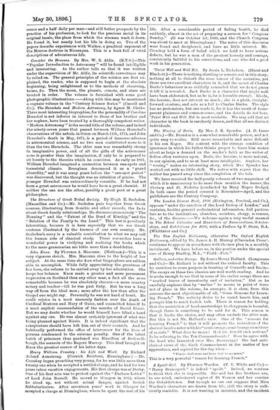The Structure of Greek Tribal Society. By Hugh E. Seebohm.
(Macmillan and Co.)—Mr. Seebohm puts together from Greek sources, illustrating from Semitic and other records, the facts about Greek family relationships. He discusses successively "The Meaning" and the "Extent of the Bond of Kinship," and the -" Relation of the Family to the Land." This last is peculiarly interesting, because it is here especially that we see Greek customs illustrated by the tenures of our own country. Mr. Scebohm's essay is a valuable contribution to what we may eau the human side of classical study. These researches have a wonderful power in 'vivifying and realising the books which to the mere grammarian are little more than a dead-letter.
John .7614x. By Florence A. Maccnnn. (Methuen.)—This is a very vigorous sketch. Mrs. Maccunn rises to the height of her subject. At the same time she does what biographers are seldom able to accomplish. While fully appreciating the greatness of her hero, she refuses to be carried away by her admiration. She keeps her balance. Knox made a greater and more permanent impression on Scotland than any other man, a fact all the more remarkable because he was absolutely obscure—a mere country notary and teacher—till he was past forty. But he was a long way off from the ideal man ; more after the law than after the Gospel one might say. Personally he was not hard of heart. He could rejoice in a most unseemly fashion over the death of Cardinal Beatoun and Mary of Guise, and committed himself to a most explicit commendation of the murder of David Rizzi°. But we may doubt whether he would himself have lifted a hand against any one. He was almost certainly ignorant of what was being planned against Rizzi°. It is indeed significant that the conspirators should have left him out of their counsels. And he habitually performed the office of intercessor for the lives of persons condemned to the extreme penalty. One of the latest batch of prisoners thus pardoned was Hamilton of Bothwell- haugh, the a.ssassin of the Regent Murray. This deed brought on Knox the greatest sorrow of his latter days.


































 Previous page
Previous page